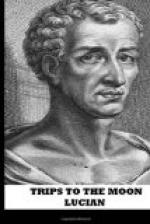I will now tell you what men of renown I met with there. And first there were all the demigods, and all the heroes that fought at Troy except Ajax the Locrian, {122b} who alone, it seems, was condemned to suffer for his crimes in the habitations of the wicked. Then there were of the barbarians both the Cyruses, Anacharsis the Scythian, Zamolxis of Thrace, {123a} and Numa the Italian; {123b} besides these I met with Lycurgus the Spartan, Phocion and Tellus of Athens, and all the wise men except Periander. {123c} I saw also Socrates, the son of Sophroniscus, prating with Nestor and Palamedes; near him were Hyacinthus of Sparta, Narcissus the Thespian, Hylas, and several other beauties: he seemed very fond of Hyacinthus. Some things were laid to his charge: it was even reported that Rhadamanthus was very angry with him, and threatened to turn him out of the island if he continued to play the fool, and would not leave off his irony and sarcasm. Of all the philosophers, Plato {123d} alone was not to be found there, but it seems he lived in a republic of his own building, and which was governed by laws framed by himself. Aristippus and Epicurus were in the highest esteem here as the most polite, benevolent, and convivial of men. Even AEsop the Phrygian was here, whom they made use of by way of buffoon. Diogenes of Sinope had so wonderfully changed his manners in this place, that he married Lais the harlot, danced and sang, got drunk, and played a thousand freaks. Not one Stoic did I see amongst them; they, it seems, were not yet got up to the top of the high hill {124a} of virtue; and as to Chrysippus, we were told that he was not to enter the island till he had taken a fourth dose of hellebore. The Academicians, we heard, were very desirous of coming here, but they stood doubting and deliberating about it, neither were they quite certain whether there was such a place as Elysium or not; perhaps they were afraid of Rhadamanthus’s judgment {124b} on them, as decisive judgments are what they would never allow. Many of them, it is reported, followed those who were coming to the island, but being too lazy to proceed, turned back when they were got half way.
Such were the principal persons whom I met with here. Achilles is had in the greatest honour among them, and next to him Theseus.
Two or three days after my arrival I met with the poet Homer, and both of us being quite at leisure, asked him several questions, and amongst the rest where he was born, that, as I informed him, having been long a matter of dispute amongst us. We were very ignorant indeed, he said, for some had made him a Chian, others a native of Smyrna, others of Colophon, but that after all he was a Babylonian, and amongst them was called Tigranes, though, after being a hostage in Greece, they had changed his name to Homer. I then asked him about those of his verses which are rejected as spurious, and whether they were his or not. He said they were all his




